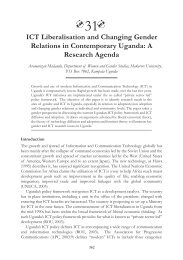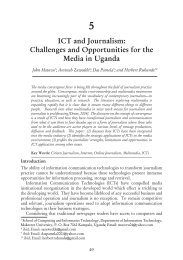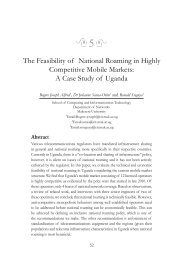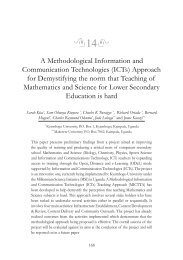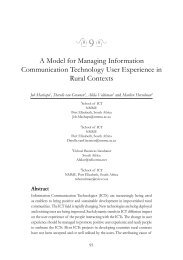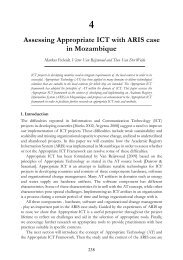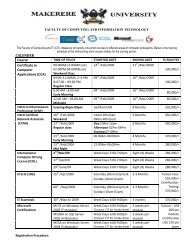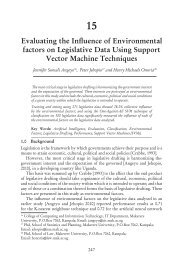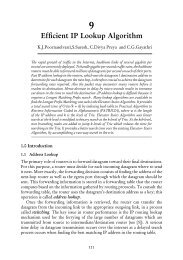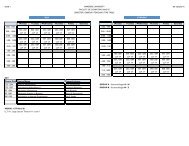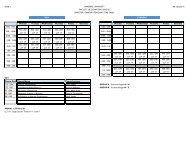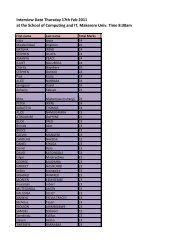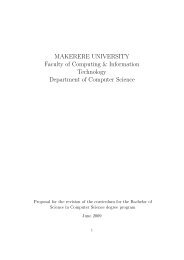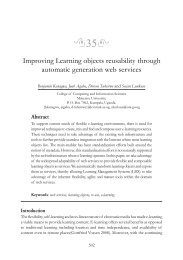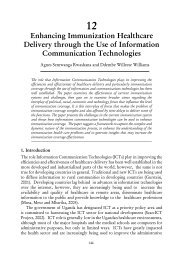Undergraduate Handbook - School of Computing and Informatics ...
Undergraduate Handbook - School of Computing and Informatics ...
Undergraduate Handbook - School of Computing and Informatics ...
You also want an ePaper? Increase the reach of your titles
YUMPU automatically turns print PDFs into web optimized ePapers that Google loves.
8.0 DEPARTMENT OF INFORMATION SYSTEMS<br />
8.1 Introduction<br />
The Information System (IS) Department is one <strong>of</strong> the four academic departments at the Faculty <strong>of</strong> <strong>Computing</strong> <strong>and</strong><br />
<strong>Informatics</strong> Technology. The department provides both undergraduate <strong>and</strong> postgraduate courses. Some areas <strong>of</strong><br />
the study <strong>and</strong> research in IS include System Analysis <strong>and</strong> Design, Data warehouses, Databases, Health <strong>Informatics</strong>,<br />
Management Information Systems <strong>and</strong> Decision Support Systems. These provide students with a thorough<br />
knowledge <strong>of</strong> the field thus providing an enduring foundation for future pr<strong>of</strong>essional growth. Information Systems<br />
students learn to become problem solvers in organizations, institutions, the economy <strong>and</strong> society. The department<br />
currently has two dynamic research groups namely: Simulation <strong>and</strong> Modelling Group <strong>and</strong> Visualization group.<br />
The department has 15 full time academic staff <strong>and</strong> a diverse collection <strong>of</strong> part time faculty to support the teaching<br />
needs for the Information Systems student community. Administrative staff members supervised by the Head <strong>of</strong><br />
Department ensure the smooth functioning <strong>of</strong> the department’s operations. Information systems specialists focus on<br />
integrating information technology solutions <strong>and</strong> business processes to meet the information needs <strong>of</strong> businesses <strong>and</strong><br />
other enterprises, enabling them to achieve their objectives in an effective, efficient way. This discipline’s<br />
perspective on information technology emphasizes information, <strong>and</strong> views technology as an instrument for<br />
generating, processing, <strong>and</strong> distributing information. Pr<strong>of</strong>essionals in the discipline are primarily concerned with the<br />
information that computer systems can provide to aid an enterprise in defining <strong>and</strong> achieving its goals, <strong>and</strong> the<br />
processes that an enterprise can implement or improve using information technology. They must underst<strong>and</strong> both<br />
technical <strong>and</strong> organizational factors, <strong>and</strong> they must be able to help an organization determine how information <strong>and</strong><br />
technology-enabled business processes can provide a competitive advantage.<br />
The department has a reputation for good teaching in a friendly environment. We have an active research<br />
programme <strong>and</strong> our staff <strong>and</strong> research students collaborate with other universities <strong>and</strong> industry around the world.<br />
Our main research specialties are in Geographical Information Systems, Information Visualization, Systematic<br />
Dynamics Modelling, <strong>and</strong> Simulation in Support for Decision Making <strong>and</strong> Health <strong>Informatics</strong>. Information System<br />
(IS) graduates are perfectly placed to adapt their careers to the evolving workplace <strong>and</strong> new career opportunities.<br />
Some <strong>of</strong> the roles IS graduates are able to fill include: Business analyst, Network analyst, Intelligence/threat analyst<br />
for top government organization, Web developer, Creative Internet campaigner, Systems designer/engineer, Ecommerce<br />
project <strong>of</strong>ficer, Assistive technology designer, Technical support analyst, Bioinformatics analyst, Change<br />
<strong>and</strong> transition manager, IS security auditor, Information Systems Project manager, Information Systems consultant,<br />
Database administrator, Analyst programmer, Development manager, Technical research <strong>of</strong>ficer, Business systems<br />
consultant <strong>and</strong> IS manager.<br />
8.2 Bachelor <strong>of</strong> Information Systems (BIS) Programme<br />
8.2.1 Overview<br />
The primary objective <strong>of</strong> the Bachelor <strong>of</strong> Information Systems (BIS) degree programme is to train students as<br />
information systems specialists in a business organisation context. The BIS will equip students with knowledge <strong>and</strong><br />
skills for planning, modeling <strong>and</strong> applying ICT to meet an organization‘s business requirements that are generally<br />
84<br />
Dr. Agnes Rwashana Semwanga<br />
Head <strong>of</strong> Department



